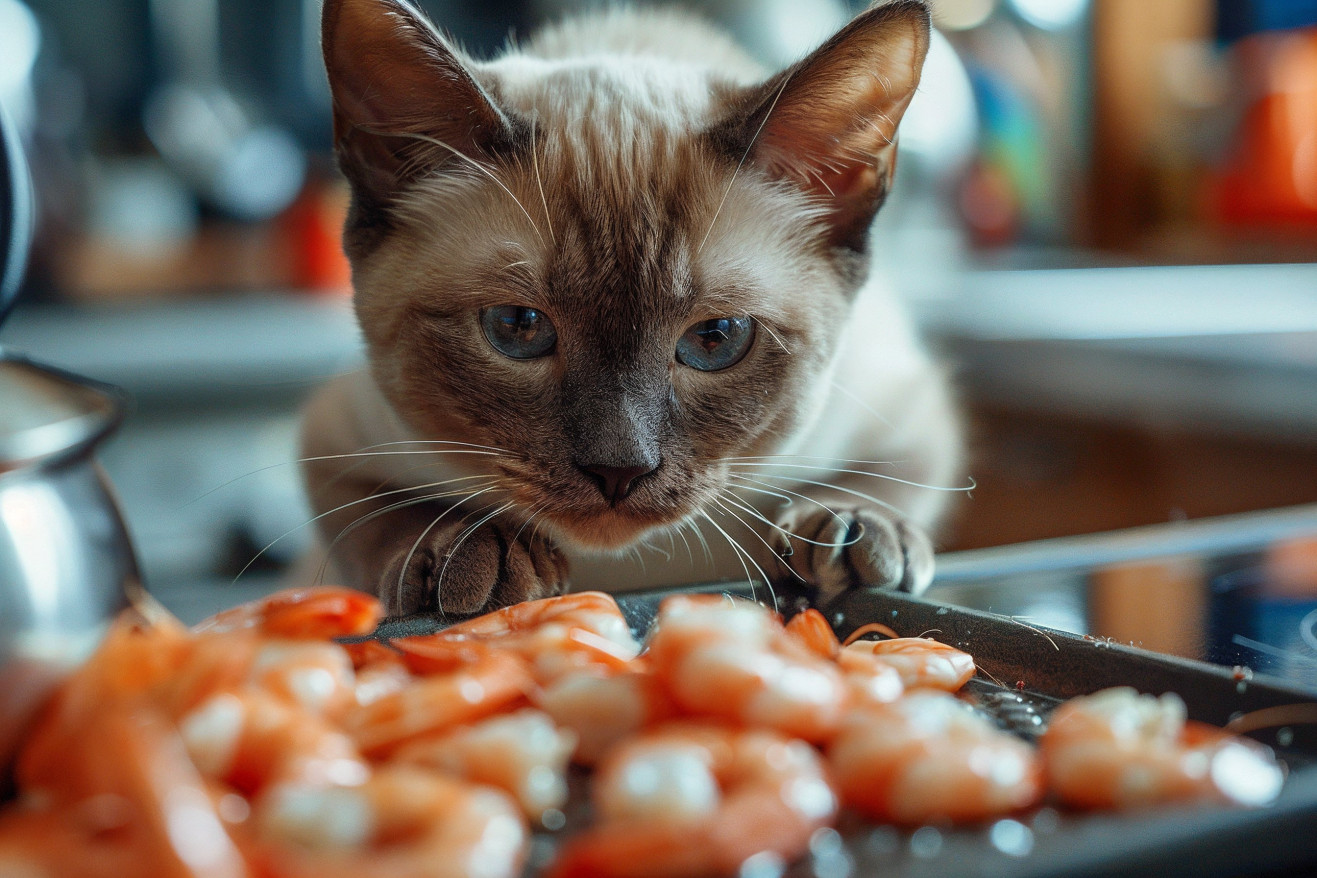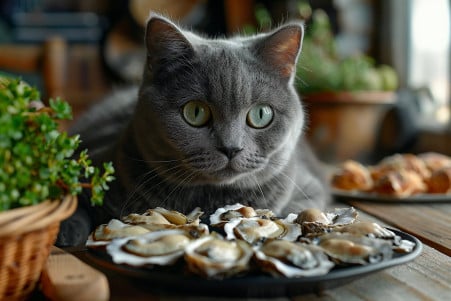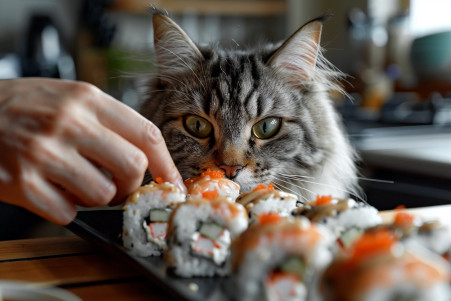Can Cats Have Raw Shrimp? A Vet Answers
16 May 2024 • Updated 15 May 2024

While it might be tempting to split a shrimp cocktail with your cat, is it OK for your furry friend to eat raw shrimp? Even though cats are obligate carnivores and can eat seafood in moderation, raw shrimp is not a good idea. In addition to being a source of dangerous bacteria like salmonella, shrimp shells and tails can be choking hazards. For the safety of your cat, it's best to steer clear of feeding them any raw fish or shellfish.
To get a better idea of the whole picture, we'll look at veterinary input, the nutritional content of shrimp, and research on the potential dangers of feeding cats raw seafood. This will give you the information you need to decide if you want to add shrimp, whether it's cooked or raw, to your cat's diet in a way that's best for their health.
Can cats eat raw shrimp?
Nutritional Benefits and Risks of Shrimp for Cats
Shrimp can have some nutritional value for cats if it is given in moderation. Cats are obligate carnivores, so they need a diet that is high in protein, and shrimp is a great source of lean protein. It also has omega-3 and omega-6 fatty acids that can help with skin and coat health, brain health, and inflammation. Shrimp is also high in the antioxidant astaxanthin and is a good source of vitamins and minerals, including calcium, iron and selenium.
That said, there are some potential downsides. Shrimp is high in cholesterol and iodine, and while these are important nutrients, they can be harmful if they are consumed in high quantities, especially for cats with certain health conditions. Shrimp also contains small amounts of mercury, which could build up in a cat's system over time. In addition, raw shrimp can contain bacteria like Vibrio that can make your cat sick.
The key is to feed shrimp in moderation and as a treat rather than a regular part of your cat's diet. It's also a good idea to talk to your vet about it, especially if your cat has any health issues. If you take the right precautions, the benefits of shrimp can outweigh the risks.
Risks of Feeding Cats Raw Shrimp
Raw shrimp can carry harmful bacteria such as salmonella and listeria, which can make cats very sick, says Shrimp in Cat Diets: Understanding Feline Nutrition. Shrimp shells and tails are also hard for cats to digest and can be a choking hazard if swallowed, according to The Wildest. Undercooked shrimp can also contain chemicals, pesticides, or other contaminants that are toxic to cats.
Raw seafood can cause cats to develop gastrointestinal problems, including vomiting and diarrhea, says Catster. Because of these dangers, it's best to avoid giving cats raw or undercooked shrimp or other seafood.
Shrimp Allergies in Cats: Symptoms and Precautions
Although rare, some cats can be allergic to the proteins in shrimp and other shellfish, according to Seafood Allergy in Cats - Symptoms, Causes, Diagnosis, Treatment, Recovery, Management, Cost. Symptoms of a shrimp allergy in cats can include skin problems, hair loss, swelling, gastrointestinal issues, and in the most severe cases, respiratory distress. Cats that already have food allergies or sensitivities are more likely to develop an allergy to shrimp, according to The 6 Most Common Food Allergies in Cats - AvoDerm.
It's important to introduce new foods like shrimp slowly and watch for any negative reactions, as mentioned in Cat Food Allergy Symptoms & Feeding Allergy-Free. If a cat has an allergic reaction to shrimp, it's important to contact a vet right away to make sure they are okay.
Portion Control and Frequency: How Much Shrimp Is Safe for Cats?
While cooked shrimp is safe for cats to eat in moderation, it should not be a regular part of their diet, according to Can Cats Eat Shrimp? | TrustedHousesitters.com. The recommended portion for cats is 1-2 shrimp a week, depending on the cat's size and other dietary needs, according to I eat a LOT of shrimp, is it ok for the cat? | TheCatSite. Larger portions or more frequent servings can result in digestive upset, dehydration, and other issues.
Shrimp must be fully cooked, deveined, and free of oils, seasonings, and sauces, all of which are toxic to cats, according to Can Cats Eat Shrimp: Safety Tips and Benefits. It's important to talk to a vet before giving shrimp or any other new food to a cat, especially if the cat has health issues.
Healthier Options and a Well-Balanced Diet for Cats
While shrimp can be a fun and occasional snack, it's important to make sure that a cat is eating a well-balanced diet of high-quality cat food, as noted by PetMD. Cat food is specifically designed to have the right amounts of protein, fats, carbohydrates, vitamins, and minerals that a cat needs to be healthy. Alternative proteins like cooked chicken, turkey, or lean meats may be healthier and more appropriate for regular snacks than shrimp, according to Purina.
By making sure that a cat is eating a well-balanced diet and then adding in a variety of snacks in moderation, you can make sure that a cat is getting all of the nutrients that it needs. A vet can help cat owners come up with a diet plan that is healthy and safe for their pets, as mentioned by Bond Vet.
Conclusion: Moderation and Veterinary Guidance for Feeding Shrimp to Cats
While shrimp can be a safe and occasional treat for cats, there are potential risks and limitations to consider. Raw shrimp should be avoided due to the risk of bacterial contamination, digestive issues, and potential choking hazards.
Cooked shrimp can provide some nutritional benefits, but it should be served in moderation and without any added ingredients or seasonings. It's essential to monitor for any adverse reactions or allergies and consult a veterinarian before introducing shrimp or any new food to a cat's diet. A balanced, high-quality cat food should remain the foundation of a cat's diet, with treats like shrimp being occasional supplements, not meal replacements.


